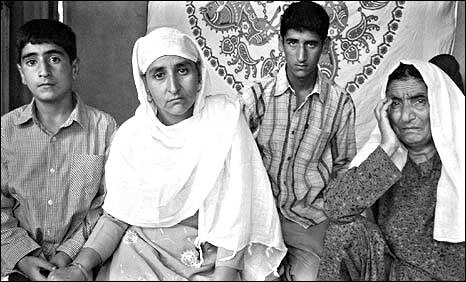A cameraman with a local cable television Javed Ahmad Mir was shot dead covering a protest in 2008 August. His widow is battling each day for survival and sustenance of her family. Aliya Bashir reports.
 (Family members of slain Javed: his widow, an orphaned son, and an aged mother.)
(Family members of slain Javed: his widow, an orphaned son, and an aged mother.)
Amir, 11, still remembers the day when he ran from his home to Bagh-e-Mehtab chowk to give slippers to his father.
“Papa was shot in the head by police. I screamed a lot. What happened to you papa. But, he failed to respond to my shrieks and wails and felt unconscious, into a pool of blood. I just tried to take hold of him. But of no avail,” recollects Amir Javeed as he was eye witness when his father was killed. His voice is choked with emotions and tears started rolling down from his eyes.
Javeed Ahmed Mir, was attending a wedding on August 13, 2008, when his office called him to cover a protest at Bagh-e-Mehtab. Kashmir was in the grip of widespread protests in the wake of the Amarnath land row. Mir reached the spot and was waiting for equipment to arrive from the office when he was shot in the head by the paramilitary.
Mir was a cameraman with local television channel – 9TV, New World Vision Broadcasting Media, and was also working as the system controller.
When his father’s blood-drenched corpse was carried to the Martyr’s graveyard of Eidgah, where he was laid to rest, Amir walked bare feet. “Why did you kill my father. Who will bring him back,” were the innocent questions that Amir raised when his father was killed.
The haunting memories of his father’s death are still afresh in Amir’s mind. “I have still preserved that slipper, which always reminds me of that moment when my father was brutally killed,” says Amir. “My father would provide me a hiding place to avoid mama’s scolding for not studying properly. But, now everything has changed in our home.”
In her single storey residence at Beighpora Bagh-e-Mehtab Javed’s widow, Hafeeza Bano spins a yarn to support her three sons.
“When my husband was alive, he used to move from pillar to post to meet the demands of our family. Now, I don’t have any saving. When we build our house we took a loan of 51,000 rupees which is yet to be repaid. I have nowhere to go. I am at the mercy of God,” says Hafeeza.
Barely a month after the death of her husband, Hafeeza says, friends and relatives turned a blind eye.
“My husband was pious and helpful. People would come to him whenever they had any problem in cable services in the colony. But, now he is no more, nobody visits my home to help me,” she says.
“Instead of sympathizing with me, they say I am not the only one whose husband was killed.”
The helplessness, that Hafeeza, felt that year has not diminished and poverty and hardships have only made life agonizing. Promises of help by government functionaries and political leaders have rarely materialised.
“Life has given me a cruel shock. I now live only for my children,” she says. “Since I was married, I always used to be confined to home. Now that I am left all alone to look after my sons.”
When Hafeeza was married, she expected to lead a peaceful life of domesticity. But that was not to be. She was widowed at the age of 30. Relatives asked her to remarry but she refused.
“Why should I remarry. I have three sons and they are my biggest support,” says Hafeeza while breaking into tears.
People also suggested her to send children to an orphanage. “We do feel lonely and their loss is going to remain as a vacuum in our lives. But, I can’t see the pain of isolation in their eyes. They had already lost a parent,” she says.
Hafeeza says that no doubt the kids in the orphanage are provided food, clothing and shelter, but she cannot shrug off her responsibilities and devoid them of the care and passionate hugs and kisses of their mother.
“I swear by my martyred husband’s blood that I don’t have even money to purchase rice, uniform or books for my young children,” she says. “At times I am so much swayed by emotions that I try to kill myself. But then, I think about my children.”
“Their father used to work hard to provide them with a better life with the jewel of education. But now our every dream is shattered,” Hafeeza says.
Hafeeza had take out her children from their school and put them in another as she could not afford the fee of the school they were reading in. “I literally begged them to exempt them for paying fees. They gave us some relaxation but we were forced to leave that school. Then I admitted my ward in another school after lot of pleading,” she says.
Hafeeza says Javed wanted to send their elder son, Irfan, 17, for further studies outside the valley after high school.
“When Irfan’s matric (high school) results were declared, our celebration turned into mourning,” she says. Her other son, Umar, studies in 6th class and the younger one Amir in 5th class.
Broken by pain and worries, Hafeeza puts her head on the broken door of her home and laments on the misfortune that she had faced after losing her husband.
“My husband would not take a morsel of food if he couldn’t find me before him. I am not able to sleep. I am restless,” Hafeeza says.















